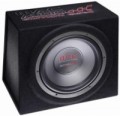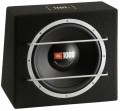Max. power
The maximum signal power that the subwoofer is able to withstand for a short time (up to several seconds) without any negative consequences. When selecting an amplifier-subwoofer pair, it is recommended to take a subwoofer with a maximum power of at least twice the maximum power of the amplifier. In general, the higher the maximum power, the more resistant the subwoofer is to overloads.
Frequency range
The range of audio frequencies reproduced by the subwoofer. It is believed that the human ear is capable of perceiving a frequency range of the order of 16 – 20,000 Hz, but in this case note that the subwoofer is designed to reproduce the lower frequency band (up to 200 Hz). Accordingly, in the case of the lower limit of the range, everything is simple: “the lower, the better”; the upper one should not be lower than the lower limit of the main car audio — otherwise there will be "gaps" in the frequencies, which will affect the sound quality.
Sensitivity
Sensitivity determines the loudness of the subwoofer when a signal of a certain power is connected to it: with equal signal power and impedance (see below), the subwoofer with the higher sensitivity will sound louder.
Protective grille
The presence
of protective devices in front of the main speaker of the subwoofer — this can be the grill itself, metal rods, plastic elements, etc. Such devices protect the device from foreign objects to a certain extent, and they can also play an aesthetic role.
Material
— MDF. Abbreviation for medium density fiberboard, i.e. medium density fibreboard. This material is inexpensive, easy to process and has a uniform structure, which is important for speaker cabinets. As a result, most modern cabinet subwoofers are made from MDF.
— Resin. It is used in cases where a complex shape is needed, which is difficult to reproduce when using MDF, as well as in compact models (see "Body shape"). In addition, it has no significant advantages over MDF, and therefore is used very rarely.
— Aluminium. Aluminium is light, homogeneous, and also conducts heat well, which allows you to install powerful speakers in such cases without fear of overheating. In addition, it has an elegant appearance. On the other hand, such cases cost accordingly.
— Plastic. Relatively inexpensive and easy to process material, which, at the same time, is available in different grades and may have different properties. Due to this, plastic enclosures are found in both relatively inexpensive and fairly advanced subwoofers; the sound quality of such a subwoofer depends mainly on its general price category.
Woofer Diameter
Subwoofer main speaker size. The diameter of the woofer determines the size of the device (see above).
Woofer depth
The size of the main subwoofer speaker from the front (usually the frame protruding beyond the diffuser) to the rear edge (where the magnet is usually located). In practice, it matters when selecting enclosures for frameless models, as well as when installing Free Air (see "Design"): this is the depth to which the speaker will be "recessed" into the enclosure or trunk. And
a flat subwoofer will not always produce less bass than its more voluminous counterpart.

